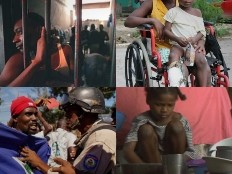|
||||||||||||||||||
| Download the revised decree and electoral calendar, published in the official journal |
|
|
Haiti - Social : Human Rights situation in Haiti 10/04/2011 13:08:31
The Bureau of Democracy, Human Rights, and Labor of the U.S. State Department released its annual report on the situation of human right. Concerning Haiti, the report indicates among other things: Arbitrary or Unlawful Deprivation of Life The government or its agents did not commit any known politically motivated killings; however, there were allegations of involvement in extrajudicial killings. Disappearance There were no reports of politically motivated disappearances by government agents. But current and former PNH officers were accused of participation in kidnappings. There were 121 reported kidnapping victims during the year, compared with 66 through October 2009. Detention Lengthy pretrial detention was a problem during the year. By the end of the year, of the 5,331 persons in custody, only 1,722 had been tried and sentenced, while 3,609 awaited trial. Approximately one third of those awaiting trial had been incarcerated for a year or longer. Some prisons had no beds for detainees; some cells had no access to sunlight. Many prison facilities lacked basic services such as medical services, water, electricity, and medical isolation units for contagious patients. Minors and adults sometimes occupied the same cells due to lack of available space. Justice Police sometimes apprehended persons without warrants or with warrants not issued by a duly authorized official. The authorities occasionally detained individuals on unspecified charges. The government frequently did not observe the legal requirement to present detainees before a judge within 48 hours, and prolonged pretrial detention remained a serious problem. Many detainees could not afford the services of an attorney, and the government routinely did not provide free counsel. Many detainees were held in pretrial detention for extended periods, in some cases up to five years, without being informed of charges against them. Freedom of Speech and Press The law provides for freedom of speech and of the press, and the government and elected officials generally respected these rights in practice. However, there were a few incidents of local government officers and elected officials harassing or threatening journalists. Internally Displaced Persons (IDPs) The Minustah estimated that more than 8,000 displaced individuals have been subject to forced evictions (especially from land that was the location of ongoing concerns such as schools, places of worship, and businesses) by private property owners or gang members who seek to resume pre-earthquake operations. More than 11,000 others remained in situations that place them at risk of involuntary evictions and secondary displacement by private property owner Respect for Political Rights The law provides citizens the right to change their government peacefully, however in practice citizens were not always able to exercise this right. The November elections were marred by fraud, flawed voter registration lists, ballot stuffing, intimidation, and some violence at the polls. The Government Transparency The law provides criminal penalties for official corruption; however, the government did not implement the law effectively, and officials often engaged in corrupt practices with impunity. According to the World Bank's worldwide governance indicators, government corruption was a severe problem. Corruption remained widespread in all branches and at all levels of government. Women Reported sexual assault cases increased significantly. HNP statistics showed that 974 rapes were reported by the end of the year, compared with 218 through October 2009. Of these, 84 victims were minors. NGOs noted alarming increases in sexual violence against women in IDP camps. In Saint-Marc the Federation for Women of the Lower Artibonite reported that it provided shelter services for 516 women and girls and assisted 909 victims of violence during the year. Women did not enjoy the same social and economic status as men. In some social strata, tradition limited women's roles. The majority of women in rural areas remained in the traditional occupations of farming, marketing, and domestic labor. Very poor female heads of household in urban areas also often faced limited employment opportunities, working in domestic labor and sales. Government and private sectors seldom promoted women to supervisory positions. Children Primary and secondary education was not compulsory, free, and universal. Before January 12, only half of school-age children were enrolled in classes. Almost 5,000 school buildings in the earthquake zone were destroyed or damaged on January 12. Hundreds of teachers and thousands of students were killed. Many families who were not able to get their children into a public school paid for their children to attend private schools, which were generally unaccredited and unregulated. Credible sources reported that over 200,000 domestically trafficked children worked as indentured household servants, or "restaveks". Approximately 65 percent of these children are girls, and nearly three quarters of them work as servants in the home of relatives. Persons with Disabilities The constitution and laws do not explicitly prohibit discrimination against persons with physical and mental disabilities, and there were no reports of discrimination by the government against persons with disabilities in employment, education, access to health care, or the provision of other state services. However, because of widespread and chronic poverty, a shortage of public services, and limited educational opportunities, persons with disabilities were severely disadvantaged. According to the National Network for the Defense of Human Rights (RNDDH), approximately 805,000 persons lived with a physical disability during the year. Only 3 percent of children with disabilities have access to schools. Acceptable Conditions of Work On October 1, the daily minimum wage increased from 125 gourds (approximately $3.00) to 150 gourds (approximately $3.60) in the textile sector and remained at 200 gourds (approximately $4.80) in the commercial and industrial sectors. Workers paid at a piecework rate received a minimum of 200 gourds per day. For all other industrial and commercial establishments, the daily minimum wage was fixed at HTG200 for eight hours of work. Most citizens worked in the informal sector and subsistence agriculture, in which minimum wage legislation does not apply, and daily wages of 15 gourds ($0.37) were common. Many women worked as domestic employees, an area of work also exempted from minimum wage legislation. HL/ HaitiLibre
|
|
|
Why HaitiLibre ? |
Contact us |
Français
Copyright © 2010 - 2026 Haitilibre.com |





